Hoverboards can be tricky, even when working properly. If defective, a hoverboard can be even more dangerous. According to the Federal Consumer Product Safety Commission, hoverboards have caused 29 emergency room visits and 11 home fires. Regulators have instituted a defective product inquiry. Most accidents occur when lithium-ion batteries overheat and ignite. In 2015, a Louisiana home caught fire when a hoverboard burst into flames; a scooter ignited on an Alabama sidewalk, and holiday mall shoppers in Washington watched a hoverboard spontaneously combust. Most online retailers removed these two-wheeled scooters from their websites. Chinese companies continue to manufacture hoverboards for sale on eBay and these products are still on the market. Hoverboards are especially dangerous because defects are not readily apparent. Recovering compensation for hoverboard injuries may be difficult, but not impossible.
Guidelines for Using Products with Lithium-Ion Batteries
 Hoverboards, as well as laptops and other electronics, frequently contain
lithium-ion batteries. These high-energy devices are susceptible to igniting.
Follow these guidelines to protect your safety and prevent property damage:
Hoverboards, as well as laptops and other electronics, frequently contain
lithium-ion batteries. These high-energy devices are susceptible to igniting.
Follow these guidelines to protect your safety and prevent property damage:
-
Check the owner’s manual to determine whether you have a lithium-ion battery or a lithium-metal battery
-
In order to prevent a fire from spreading, it is best to stay at home when you are charging electronics
-
Report any incidents to the Federal Consumer Product Safety Commission

